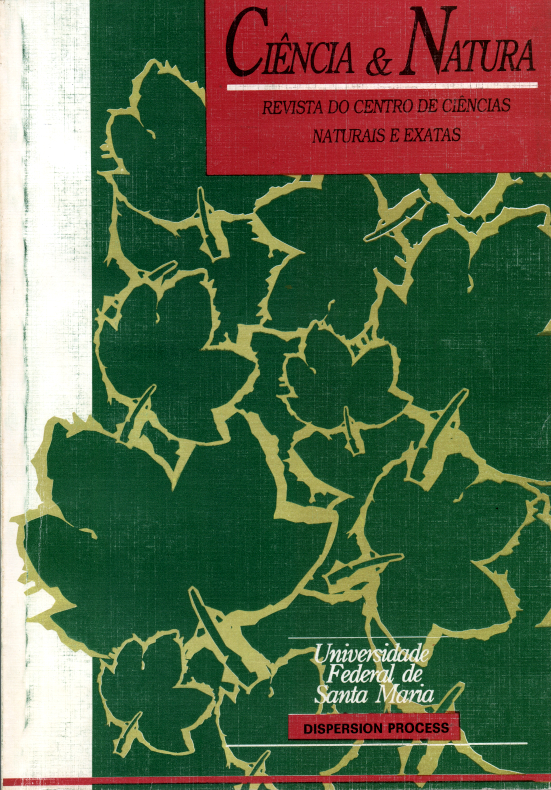Variability of boundary layer processes for the metropolitan area of São Paulo during winter
DOI:
https://doi.org/10.5902/2179460X36913Resumo
As variações espaciais e temporais da Camada Limite planetária (CLP) da Área Metropolitana da cidade de São Paulo (RMSP) durante o período de 23 de julho a 15 de Agosto de 1999 são estudas utilizando dados de um Sodar Doppler. RMSP (λ = 23º34’ S e φ = 46º44’ W) está numa altitude de 800 m acima do nível médio do mar, localizada 60 km à noroeste do oceano Atlântico, limitada por cadeias de montanhas ao norte, tendo uma orografia complexa e configura-se numa ilha de calor urbana.
Este trabalho tem o objetivo de entender o impacto da urbanização sobre os processos de CLP particularmente durante a estação de inverno. Um número de diferentes tipos de experimentos estiveram em operação durante uma campanha de inverno organizada pelo IAG-USP. O Sodar Doppler fornece dados sobre (i) função estrutura de temperatura, CT2, (ii) velocidade do vento horizontal, u, (iii) velocidade do vento vertical, w, (iv) desvios padrão do vento horizontal e vertical, σu, σv e σw, e (v) altura da inversão de temperatura, Zi.
A análise dos dados fornecidos pelo Sodar mostra claramente as variações desses parâmetros em alturas indo de 50 m até 1500 m com intervalos de 50 m num intervalo de tempo de 15 minutos. Existe grande variação desses parâmetros com a altura.
O aumento noturno no campo do vento horizontal com a altura é bem marcado indicando a quase ausência de transporte vertical de momento horizontal durante a noite em condições estáveis. Durante as horas da manhã a aceleração na velocidade do vento é evidente. O aumento anormal em Zi durante a noite sob condições estáveis prevalece durante o inverno com valores mais altos em agosto do que em julho.Downloads
Referências
Freitas, E. D., M. A. F. Silva Dias, K. N. Nair and P. L. Silva Dias, 1999: Use of Doppler Sodar in Atmospheric Measurements. Workshop on Physics of the Planetary Boundary Layer and Dispersion Process Modelling. DOI: https://doi.org/10.5902/2179460X36911
Santa Maria – RS, Brasil.
Gallo, C. P. and T. W. Owen, 1999: Satellite-Biased Adjustments for the Urban Heat Island Temperature Bias. J. Applied Meteorol., 38, 806-813. DOI: https://doi.org/10.1175/1520-0450(1999)038<0806:SBAFTU>2.0.CO;2
Little, C. G., 1969: Acoustic methods for the remote probing of the lower atmosphere. Proc. IEEE, 57, 571-578. DOI: https://doi.org/10.1109/PROC.1969.7010
Nair, K. N., P. K. Kunrikrishnan, K. S. Gupta and R. Ramachadran, 1989: Sudy of vertical wind and temperature turbulence in a convective boudary layer from Sodar observation at Thumba. Indian Journal of Radio & Space Physics, 18, 157-159.
Oke, T. R., 1973: City Size and the Urban Heat Island. Atmos. Environ., 7, 769-779. DOI: https://doi.org/10.1016/0004-6981(73)90140-6
Downloads
Publicado
Como Citar
Edição
Seção
Licença
Para acessar a DECLARAÇÃO DE ORIGINALIDADE E EXCLUSIVIDADE E CESSÃO DE DIREITOS AUTORAIS clique aqui.
Diretrizes Éticas para Publicação de Revistas
A revista Ciência e Natura está empenhada em garantir a ética na publicação e na qualidade dos artigos.
A conformidade com padrões de comportamento ético é, portanto, esperada de todas as partes envolvidas: Autores, Editores e Revisores.
Em particular,
Autores: Os Autores devem apresentar uma discussão objetiva sobre a importância do trabalho de pesquisa, bem como detalhes e referências suficientes para permitir que outros reproduzam as experiências. Declarações fraudulentas ou intencionalmente incorretas constituem comportamento antiético e são inaceitáveis. Artigos de Revisão também devem ser objetivos, abrangentes e relatos precisos do estado da arte. Os Autores devem assegurar que seu trabalho é uma obra totalmente original, e se o trabalho e / ou palavras de outros têm sido utilizadas, isso tem sido devidamente reconhecido. O plágio em todas as suas formas constitui um comportamento publicitário não ético e é inaceitável. Submeter o mesmo manuscrito a mais de um jornal simultaneamente constitui um comportamento publicitário não ético e é inaceitável. Os Autores não devem submeter artigos que descrevam essencialmente a mesma pesquisa a mais de uma revista. O Autor correspondente deve garantir que haja um consenso total de todos os Co-autores na aprovação da versão final do artigo e sua submissão para publicação.
Editores: Os Editores devem avaliar manuscritos exclusivamente com base no seu mérito acadêmico. Um Editor não deve usar informações não publicadas na própria pesquisa do Editor sem o consentimento expresso por escrito do Autor. Os Editores devem tomar medidas de resposta razoável quando tiverem sido apresentadas queixas éticas relativas a um manuscrito submetido ou publicado.
Revisores: Todos os manuscritos recebidos para revisão devem ser tratados como documentos confidenciais. As informações ou ideias privilegiadas obtidas através da análise por pares devem ser mantidas confidenciais e não utilizadas para vantagens pessoais. As revisões devem ser conduzidas objetivamente e as observações devem ser formuladas claramente com argumentos de apoio, de modo que os Autores possam usá-los para melhorar o artigo. Qualquer Revisor selecionado que se sinta desqualificado para rever a pesquisa relatada em um manuscrito ou sabe que sua rápida revisão será impossível deve notificar o Editor e desculpar-se do processo de revisão. Os Revisores não devem considerar manuscritos nos quais tenham conflitos de interesse resultantes de relacionamentos ou conexões competitivas, colaborativas ou outras conexões com qualquer dos autores, empresas ou instituições conectadas aos documentos.






